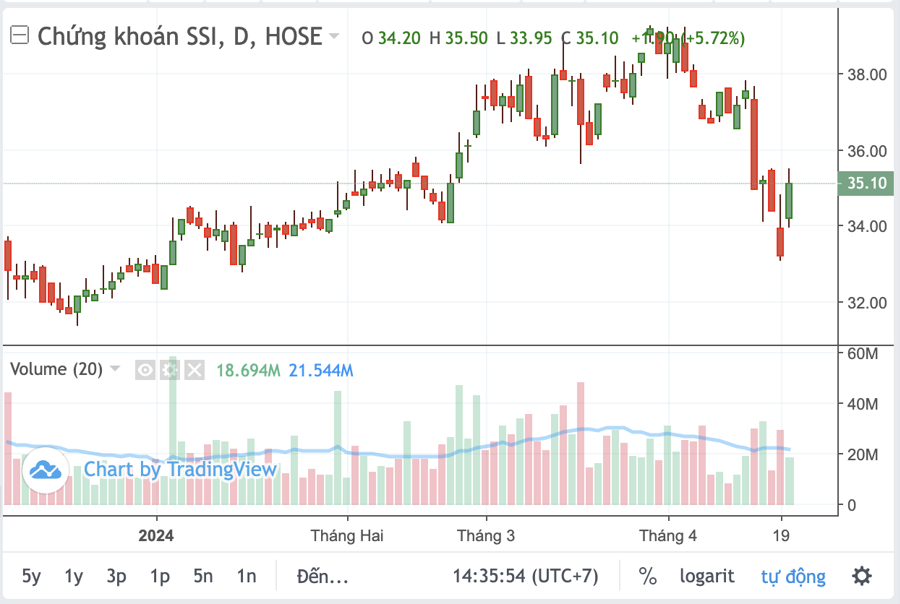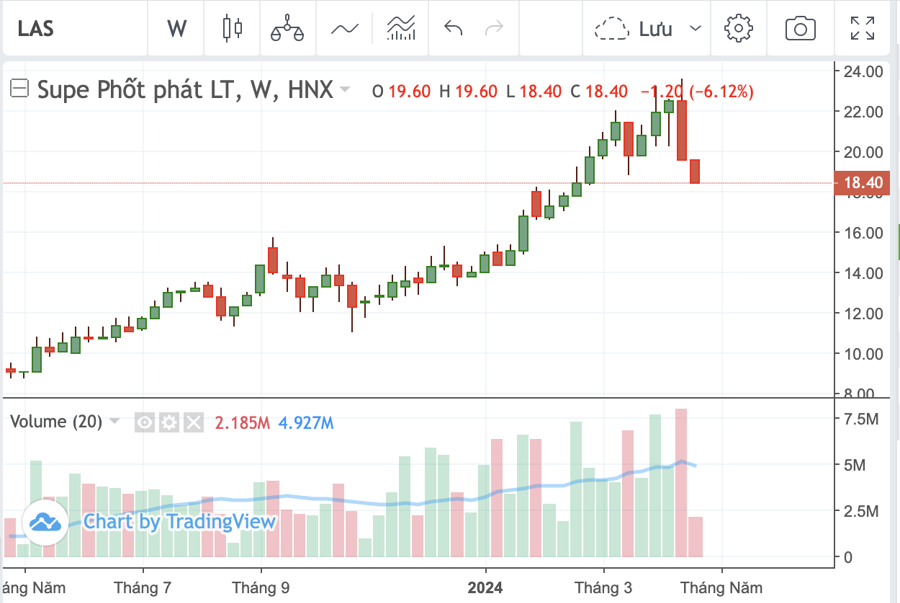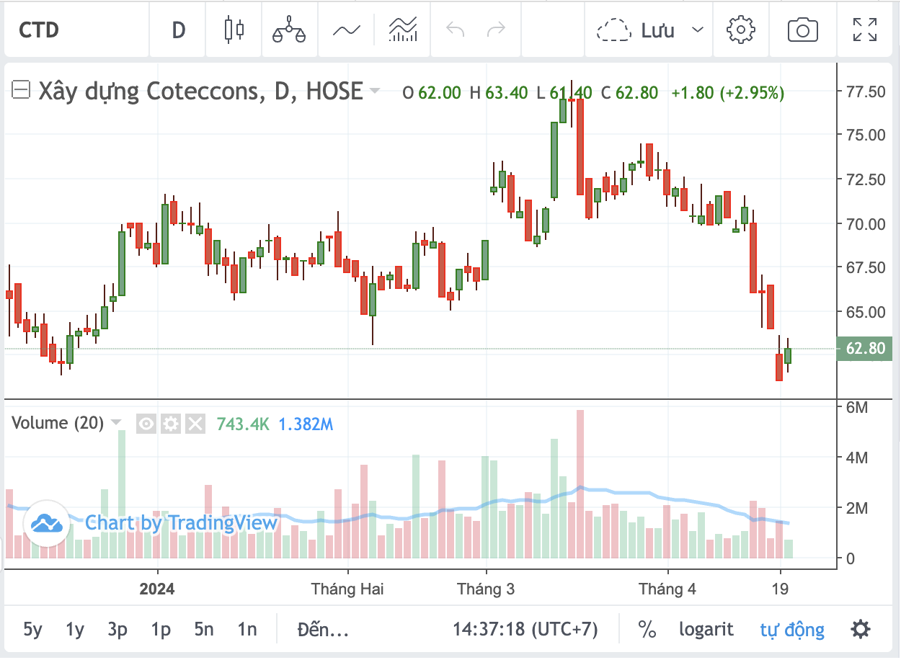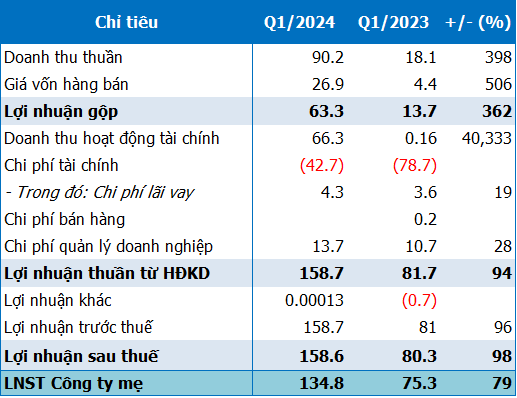The index’s point-decline pressure in the just-closed trading week was primarily driven by the tense news in the Middle East, especially after the State Bank officially announced the sale of foreign currency for immediate settlement to stabilize exchange rates. In just 1 week, VN-Index declined over 4 sessions, losing 101.75 points, or 7.97%, down to 1174.85 points. Calculated from the peak reached on 3/28, the index fell by 116 points, equivalent to -8.9%.
However, the degree of loss for each stock individually was considerably greater than that of the Vn-Index. The number of stocks experiencing a drop that was 2-3 times greater than the overall market was not unusual. Many stocks have returned to their early 2024 price ranges despite recently announced “shocking” profit growth and projections of significant growth throughout 2024.
Take the case of Hoa Phat Group’s HPG as an illustration. At the recently held annual general meeting of shareholders, Hoa Phat Chairman Tran Dinh Long revealed that Hoa Phat had achieved a profit of VND 2,869 billion in Q1/2024, equivalent to 28.7% of its annual plan. Compared to the same period last year, Hoa Phat’s profit had increased by a factor of 7.5. In 2024, the group set a goal of VND 140,000 billion in revenue and VND 10,000 billion in after-tax profit, representing a 47% increase over what was achieved in 2023.
On the stock market, despite the positive profit growth, the market price of HPG plunged sharply after reaching a peak in late March of VND 31,000 per share, falling to VND 27,950 per share as of the April 22 session, representing a 10% decrease back to January 2024 price levels.
With the securities group, represented by SSI, in Q1 this securities company recorded a 33% increase in revenue compared to the same period last year, reaching nearly VND 1,920 billion. SSI’s pre-tax and after-tax profits were VND 900 billion and VND 727 billion, respectively, up by more than 50% compared to the same period. Despite the strong profit growth, SSI’s market price, after reaching VND 38,000, also reversed course and fell back to its early 2024 price of VND 33,000 per share, representing a 13% decrease.

This occurred similarly with VCI stock, as VCI’s market price fell by 18% from its peak despite positive business performance recovery, although it has since rebounded to VND 47,000 per share during today’s session.
In the fertilizer and chemical group, including DPM, DCM, and LAS, market prices fell sharply by 19%, 17%, and 17%, respectively. Among them, DPM estimated that in Q1/2024, revenue would exceed VND 3,200 billion and pre-tax profit would be VND 310 billion, an 18% increase compared to the same period last year and more than double the previous quarter.
LAS also announced its Q1 business results at the 2024 general meeting of shareholders, which showed many positive signs. Q1/2024 revenue is estimated to reach nearly VND 1,500 billion, a 30% increase over Q1/2023; after-tax profit is expected to be not less than VND 60 billion, double the same period last year. This result was achieved thanks to LAS taking advantage of low-priced raw materials. For the whole year, LAS has set a revenue target of VND 3,600 billion and a pre-tax profit of VND 136 billion. This profit level is considered modest because in Q1/2024, LAS had already achieved 50% of its profit plan.
The fertilizer stock group is also expected to benefit significantly from the Draft Law on Value Added Tax (amended). Most recently, the Government has directed the Ministry of Finance to finalize the Law on Value Added Tax (amended) and submit it to the Prime Minister before submitting it to the National Assembly at the upcoming session in May-June.
In it, the Ministry of Finance eliminates fertilizers from being subject to non-value-added tax and adds this item to the list of those subject to a 5% tax. This is something that businesses have been hoping for for more than 10 years. Once the 5% deductible input tax is implemented, business profits will recover significantly compared to the previous period.

For the construction group, CTD recorded consolidated profit for the second quarter of fiscal year 2024 (equivalent to Q4/2023) with net revenue of nearly VND 5,660 billion, a 9% decrease compared to the same period last year. However, Coteccons Construction’s after-tax profit increased by 3.6 times, reaching VND 69 billion. This is the second quarter after the company changed its fiscal year.
Thus, for the first half of fiscal year 2024 (from Q2 – Q4/2023), Coteccons Construction recorded revenue of nearly VND 9,783 billion, a slight 5% increase compared to the corresponding period, but after-tax profit increased by 9 times, reaching over VND 135 billion. Compared to the business plan set out, this enterprise has completed 55% of its revenue target and 50% of its after-tax profit target.
However, in the market, CTD’s market price has decreased by 18% from its peak in mid-March to VND 63,000 per share on the trading session of April 22.

Many other stocks also recorded sharp declines twice as large as the VN-Index, such as MSN, down 16%; ANV decreased by nearly 20%… In 2024, Masan expects to achieve after-tax profit in the range of VND 2,290 billion to VND 4,020 billion. In a positive scenario, Masan’s profit will grow strongly by double compared to the VND 1,950 billion in 2023.
With this decline, the market prices of the above group of stocks are being assessed as more attractive compared to the general market level due to the good profit growth prospects of this group in 2024.











































